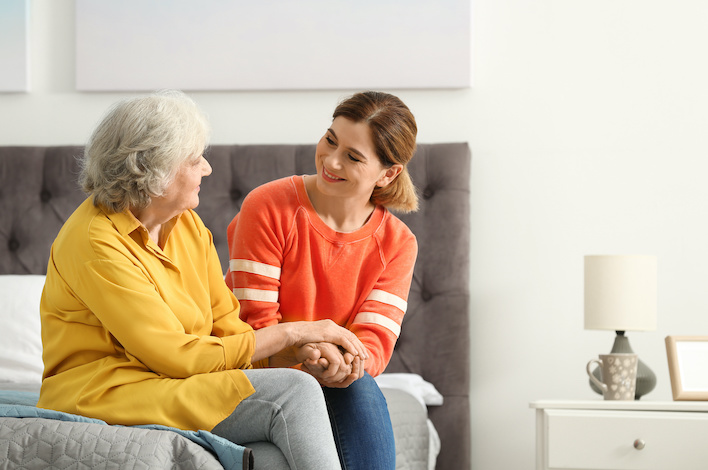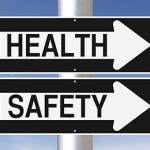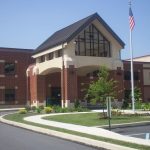November is National Family Caregivers Month, a time to focus on the needs of and the issues that face people who care for family members with dementia and other debilitating diseases.
This year, with all the challenges presented by COVID-19, the task of caregiving — already taxing — has become even more difficult. Also, consider that 34% of these caregivers are 50 to 64, 12% are 65 to 74 and 7% are 75 or older (according the AARP), and may be soon facing medical concerns of their own, if they aren’t already.
Melissa Oley, marketing and admissions liaison for the personal and memory care neighborhood at The Heritage of Green Hills, a healthy lifeplan community in Shillington, Pa. has some advice for caregivers and those who wish to support the caregivers in their lives, based on her 20 years of experience in senior living and skilled nursing facilities, as well as her training as a social worker.
Educate Yourself, Now
“Caregiving is emotionally and physically demanding,” says Oley. “There will likely come a time when being the sole caregiver for your loved one will become impossible, either through a medical emergency, a change in your own health, behavioral/safety issues or other unforeseen circumstances.”
“It’s important to research the pros and cons of each of your options — homecare or residential personal care/assisted living care — before the crisis happens and you are dealing with everything at once.”
COVID-19 is making this pre-crisis education even more important. “Homecare is very popular right now, but unfortunately that means that it may not be available when you need it. If that is the best option for you and your loved one, then you may wish to get on a waiting list.”
When help with care is needed for several hours each day, in-home care can become impractical and cost-prohibitive, but many caregivers feel guilty for considering residential care.
“Some people worry that they’re letting their loved one down,” says Oley. “I’ve also spoken to many people who are worried that they will be judged by friends and family members. But the truth is that caregivers are still caregivers, even if their loved ones have moved into a residential community. Our family members are highly involved. They advocate for their parents and spouses, and check in on them often.”
In many cases, it’s an improvement in quality of life for all parties, says Oley.
“For residents, living in a personal care or assisted living community offers so much more than 24/7 care and supervision by professionals. They get all the benefits of group activities, and engaging and interacting with their peers. We are social beings and being socially isolated is detrimental to our physical and emotional wellness.
“At the same time, since caregivers are relieved of all the physical tasks of caregiving and may experience a lightening of some of the emotional load, they can focus on the relationship they have with their loved one, instead of daily caregiving tasks.”
Take Care of Yourself
Caregiving is difficult and constant. With COVID-19, caregivers who may have had more regular breaks and support from extended family and adult daycare situations, are facing emotional and physical burnout, says Oley.
“The most important thing for caregivers to remember is that you can’t help your loved one if you aren’t taking care of yourself. Be sure to take moments that are yours and yours alone. Read, meditate, ask a trusted friend to take over your caregiving duties on a schedule so you can take regular walks. Find time for your own mental and physical needs.”
A common mistake for caregivers to make is to skip their own doctors’ appointments — even as they make sure their loved ones get the care they need.
“You are no good to your loved one sick,” reminds Oley. “Ignoring your own health harms both of you.”
Reach Out for Help
For various reasons, caregivers can start to become more and more isolated.
“You are not alone,” Oley says. “Part of caring for yourself and for your loved one is seeking out help in the form of friends, family, neighbors and a support group. COVID has changed the ways you can connect to resources, but help is still available.”
The Heritage of Green Hills co-hosts a monthly caregiver support group with the Delaware Valley Chapter of the Alzheimer’s Association on the third Wednesday of each month from 3:00 p.m. to 4:30 p.m.
“We’re here to lend an educated and supportive ear to any individual caring for a loved one with a debilitating disease,” says Oley. “The group also educates participants and helps them develop the skills and confidence to solve caregiving challenges. Some attendees are looking for specific information, others want to be connected to resources and some seek emotional support. We work hard to meet individuals at whatever level they need.”
Due to the pandemic, the support groups are currently being held virtually online and by phone. “Please don’t let a lack of computer know-how stop you from attending — you can attend by calling in on your phone.”
The final support group of 2020 will be held December 16, from 3:00 p.m. to 4:30 p.m. To register visit https://bit.ly/Dec2020Caregiver or call 800-272-3900.
To learn more about the caregiver support group, contact Melissa Oley at 484-755-3228 or email [email protected].




